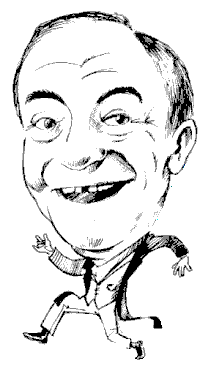|
"Let me make a nation's songs, and let who will make their laws" By Roy Hudd A pal of mine, auditioning for Andrew Lloyd Webber, announced he would sing The Impossible Dream. "Oh dear" groaned the great man. "Well you can't write them all!" said the bold auditionee. I'd have given him the job on the spot. Today it does seem as if Sir Andrew and about half a dozen others do "write 'em all". Not so in the heyday of the music hall. Song writing in the so called good old days was a different ball game entirely. There were hundreds of 'em at it and, almost without exception, they were all treated like something you find on the bottom of your shoe. Their finest creations were usually tailor made to suit a particular performer and sold, outright, to him or her for a guinea or two, plus a small percentage from the sale of the sheet music. Most, like America's "Father of Popular Music" Stephen Foster, died forgotten and penniless. It wasn't until the PRS (Performing Right Society) was formed in 1914 that these poets and peasants were able to collect money every time their songs were performed. Suddenly the millionaire song writer was here. Well, not quite true. It had happened at least once before. Chas. K. Harris wrote his hit After the Ball in 1892 and its sheet music sales topped ten million copies! He was fairly comfortable. There were some bad misses. A man called John Stafford Smith must still be revolving in his grave at the late appearance of the PRS. He wrote, in pre music-hall days, a signature tune for his club, The Anacreontics. The tune crossed the ocean where it, with new words, became The Star Spangled Banner.
All the early songwriters were prolific. They had to be, to live! Harry Clifton (Polly Perkins of Paddingion Green) wrote all his own words but 'borrowed' most of his tunes from old folk songs. Hearing a man with a concertina play a tune he'd never heard before Harry remarked "I wish I'd written that". "You will Harry, you will" rejoined a friend. George Ware, composer of that most beautiful music hall song The Boy In The Gallery saw the light and became Marie Lloyd's agent. Harry Dacre (Sons of the Sea, I'll Be Your Sweetheart and Daisy Bell) had to emigrate to America before he was 'rated'. The music hall performer Clarice Mayne had the best idea. Her songwriter, James W. Tate, (A Broken Doll) became her husband and the pianist in her act, 'Clarice Mayne and That'. He later composed The Maid of the Mountains. George Le Brunn (Oh Mr Porter) collaborated with all the great lyric writers of the time but would often arrive at a hall to deliver a new song only to realise he hadn't got the band parts. Messengers were sent on a tour of all the hostelries he had visited on his way there. I met a lady in a cafe once who thanked me for all the nice things I had said about her Dad. Her Dad was Edgar Bateman who wrote the unforgettable lyrics of It's a Great Big Shame and The 'Ouses in Between among hundreds of others. He, who was called 'The Shakespeare of Aldgate Pump', finished up listening to performances of music hall songs on the radio and reporting back to the publishers. Leslie Stuart (The Lily of Laguna) began his musical life as a church organist before he created so many of Eugene Stratton's songs and went on to compose Florodora. Perhaps the most successful songwriters who graduated from music hall to revue, musical comedy, radio and films were R.P. Weston and Bert Lee. R.P. started in Concert Party and Bert as a church organist. They both had enormous hits on their own and teamed up just before the First World War (and the PRS!). Everything from Good-Bye-Ee to Bobby Howes musicals and Stanley Holloway monologues flowed from their pens. They had over three thousand songs published and were both in at the birth of a fair deal for songwriters. And then there was ... I do get carried away but I hope that just a mention of this tiny handful of forgotten names will show how important the writer has always been to our greatest entertainment heritage - the music hall. Caricature of Roy Hudd by Paul SelveyThe Hiss and Boo Company expresses their grateful thanks to Roy Hudd for so kindly contributing his article |
 Some of the classic songs you'll maybe hear tonight were
spawned hy a real rag, tag and bobtail crew. Fred Gilbert
(The Man That Broke the Bank At Monte Carlo) and Joseph
Tabrar (Daddy Wouldn't Buy me a Bow-Wow) were both
ex boy choristers. Joseph, who later became a plumber and
a bell hanger, would, like most of his ilk, write songs to
order; good 'uns too!. He wrote thousands during his sixty
year career. He used to boast "Vagner!, Arthur Sullivan!
- gertcher! - I can do all they could do and more, while
you wait... and on a bit of old paper the trotters is wrapped
in!"
Some of the classic songs you'll maybe hear tonight were
spawned hy a real rag, tag and bobtail crew. Fred Gilbert
(The Man That Broke the Bank At Monte Carlo) and Joseph
Tabrar (Daddy Wouldn't Buy me a Bow-Wow) were both
ex boy choristers. Joseph, who later became a plumber and
a bell hanger, would, like most of his ilk, write songs to
order; good 'uns too!. He wrote thousands during his sixty
year career. He used to boast "Vagner!, Arthur Sullivan!
- gertcher! - I can do all they could do and more, while
you wait... and on a bit of old paper the trotters is wrapped
in!"